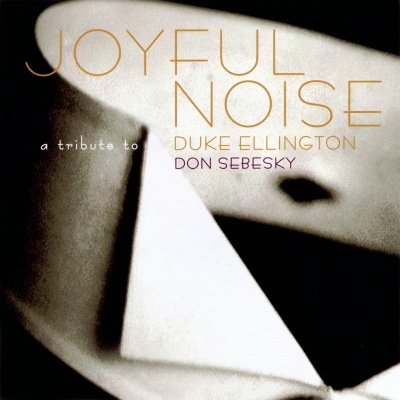
Joyful Noise: A Tribute to Duke Ellington
by Michael G. NastosThe orchestration skills of Don Sebesky are known far and wide through jazz and non-jazz circles. As an arranger he has no peer, but tackling the music of Duke Ellington in this centennial year of Ellington's birth is a daunting task. Sebesky proves up to the challenge, turning a few of Ellington's tempos 180 degrees, lavishly building on well-established melodies, adding some flourishes of his own, and composing an Ellingtonian suite as a 100th birthday present. Sebesky assembled a 23-piece band with such prominent soloists as bassist Ron Carter, trombonist Bob Brookmeyer, saxophonist Phil Woods and trumpeter Tom Harrell. They further fortify Ellington's heightened emotional aesthetic and vegetable-soup-like delicious music. Never taking a safe path, Sebesky pumps up the midnight slow ballad "Mood Indigo" into a mid-tempo swing waltz, John Pizzarelli's guitar so what backtalking with the horns. A loping bass from Carter turns into a cowboy "Creole Love Call" with able solos from Woods and Harrell. The classic ballad "Chelsea Bridge" and "Take the Coltrane" are both fairly up swingers, the former with cleverly staggered phrases in the melody contrasting with the shouting horns, the latter where Sebesky uses upper register horns to state the basic, simple theme that was Coltrane's sound on this tune originally done by Trane and Duke. "Caravan" and "Satin Doll" are more typical rhythmically, Sebesky dropping orchestral layer upon layer on the camel's back for "Caravan," while the face of "Doll" is shadowed in thick rouge by Carter's bass way up in the mix, his lines running contrary to the band playing this well-known melody, lipstick traces provided by Woods, mascara dripping via Pizzarelli's coyish scatting and guitar licks. "Warm Valley" is as expansive a ballad as you'd expect from Sebesky; it's an organ of sheer beauty. The nineteen-plus-minute "Joyful Noise Suite" runs thorough a quoted and paraphrased melánge of Ellington catch phrases, starting with a bah-bah-doo-bop theme, merging into slinky, spooky gossamer crescendos and decrescendos, ending in a wild, hard-charging frenzy, the passages named "Gladly-Sadly-Madly." The band swings out on a euphonium led "Koko." Of all the tributes to Ellington, this is the best, a magnum opus to the maestro from a man and his band who are well aware of his grandeur, plus how to play all the right notes. Highly recommended.
